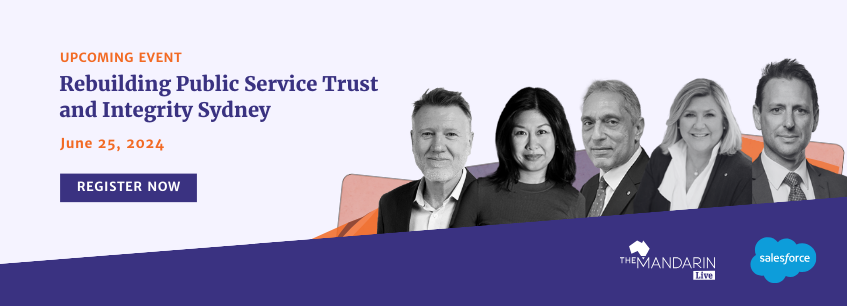
It’s well acknowledged that data are the raw material for information, and that information must be aggregated and interpreted to yield knowledge, but that knowledge does not necessarily convey judgment or wisdom.
Knowledge however is one of the preconditions to judgement and wisdom. For leaders to make wise decisions, there must be an accessible repository of data, information and knowledge with skilled personnel to interpret it.
So it is in medicine, science, health and most all other fields of human endeavour.
The accepted conventional wisdom that data does not equate to information and information does not equate to knowledge is not always on display when community activists, business lobbyists or politicians cherry-pick data — such as a carjacking in Townsville — and then jump to a pre-conceived solution — such as tougher policing.
In this column, the sixth in a series outlining the elements of a feasible path for implementing a policy objective, we present just a few maxims for policy analysts to assemble reliable knowledge.
Respect and seek out street-level knowledge
Frontline operatives commonly know a great deal about their business, the policies and systems that frame their daily activities and the idiosyncrasies of the managers in the hierarchy above them. Operational staff have antennae highly attuned to humbug; politicians and managers who apply spin and obfuscation to institutional realities rapidly lose the trust of their workforce.
Not only staff but clients with lived experience who have had to navigate health systems and people who suffer from distinctive conditions can have deep insights into what’s needed to make health systems work.
Accessing the deep insights that street-level functionaries hold about the business requires methods different from those that extract information from intellectuals. Sometimes managers can’t do it: trusted intermediaries who understand the jargons of both worlds need to be enlisted.
It’s common for tertiary-educated policy officers and senior managers who have never held an operational position to regard their own skill sets as somehow superior to those of the frontline operatives and to assume that it’s unimportant for them to know the operational details. However, every senior decision-maker needs to know enough about the details of the business to establish checks and balances and to know which adviser’s judgement is reliable.
Respect and seek out scholarly knowledge
The body of information and knowledge that scholars and researchers in all disciplines continue to assemble at an exponentially increasing rate is immense, so great that it’s tempting for politicians and policy analysts to not even bother tapping into it: it is simpler to just follow chatter from constituents or one’s own ‘common sense’.
Yes, the primary role of parliamentary representatives is to listen to their constituents, amalgamate public opinion and apply measured judgment; but these skills are necessary, not sufficient. The skills that enable somebody to gain preselection, and then sufficient community support for election, are not the same skills required to formulate public policy.
Parliamentarians are vulnerable to aligning with a long-standing anti-intellectual strand in Australian culture, sometimes quaint, sometimes dangerous. It exposes its virulent pustules from time to time, and in the pages of Murdoch media outlets continually, relentlessly, against self-identified enemies in the union and environmental movements, a phenomenon highly relevant to health policy.
So, how do we ensure quality research-based recommendations are part of the decision-making toolkit? Three features of scholarly enterprise act as barriers to the transfer of researchers’ insights into the policy sphere.
Researchers aren’t usually policy wonks
Researchers, especially those trained in the biophysical disciplines such as medicine, science and technology are unaccustomed to policy and politics, uncomfortable in engaging in public debates or advocacy, hobbled by institutional protocols from doing so or are not funded to do so at all. All of these limitations are amenable to remedies if only our policy leaders thought it important. Dialogue is required between policy leaders and curriculum leaders in tertiary educational institutions.
Doubts about scientific integrity
Hardly any data, let alone information, is entirely innocent of some kind of ‘angle’: it has been collected for some circumscribed purpose according to some defined criteria that necessarily exclude data outside the scope of the purpose. This rather self-obvious observation cannot however be extrapolated to assert that climate science is corrupt, as many Australian politicians of a conservative orientation have allowed themselves to be persuaded. The contrarians’ campaign against climate science has come to taint all scientific endeavour.
Yes, there are legitimate doubts about a good deal of industry-sponsored research in some disciplines, pharmacology being notorious. But to conflate the shortcuts, occasionally fraudulent reports and retracted articles reported in medical publications with the credibility of curiosity-led, public-good research in health generally is a logical fraud in itself.
The scientific method is the most reliable system for validating information and identifying cause-and-effect that humans have yet devised. All scientists are aware of the methodological risks in conducting experiments and are trained in precautions to avoid them. All editors of mainstream journals are sensitised to methodological weaknesses in manuscripts and labour mightily to identify them.
Disciplinary straitjackets
In government, departmental portfolios are apportioned along functional lines (or according to political considerations); and in academe, departments are circumscribed by disciplinary conventions. This allows technical expertise to flourish and people with related educational backgrounds to reinforce each other’s skills. However, this specialisation has disadvantages.
Disciplinary ‘silos’ and demarcations between research, policy and operational personnel mean that information from expert specialists must be continually translated into formats intelligible to the leaders or operatives who need it. Every organisation needs translators who can convert data and information into knowledge by:
- bridging disciplines, jurisdictional and sectoral boundaries, coordinating and melding disparate information from various sources
- changing scale, zooming in from a strategic mindset to the street-level scale, or zooming out to feed intelligence from the front lines back to the centre; and
- tracing cause and effect, articulating a theory to explain what is happening, identifying remedies for the problems uncovered and explaining the implications.
The need for translators is commonly overlooked when budget cuts are made by reducing staff to the bare minimum needed to discharge irreducible political or statutory obligations. Budgets for training, professional development, rotation of staff to gain experience at the front line and other knowledge-building tactics are a soft target for managers instructed to make savings.
Beware of tainted information
Politicians and policy analysts must continually differentiate advocacy that is in the public interest from self-interested lobbying. Some organisations such as unions and professional institutes — the Pharmacy Guild is an exemplar — have both self-interested and public-interested profiles. Leaders must continually immunise their workgroups against tainted information masquerading as objective.
The skill to do so should be an essential tool in the politicians’ toolkit, but sometimes they kick ‘own goals’. In 2015, as part of the PBS Access and Sustainability Package Access and Sustainability Package, the government allowed an industry-nominated member to be appointed to the Pharmaceutical Benefits Advisory Committee, described by Medicines Australia as “an independent expert body”. Its primary role is to recommend new medicines for listing on the Pharmaceutical Benefits Scheme, the entry point for the drug industry to suck on the public teat. No matter how competent or honest the industry-nominated representative may be (and unequivocally, no imputation otherwise is suggested), the PBAC is no longer “independent”.
Fund foundational data-gathering
Data from reliable, publicly funded entities are the bedrock of policy analysis. There are large economies of scale to be plucked if foundation data are collected by a public authority such as the Australian Bureau of Statistics rather than project by project by end users.
Where statutory permits are sought, applicants can be expected to collect their own project-specific data to justify what they want to do, but shifting the burden of broadscale data collection onto applicants is a false economy. It obliges rival applicants to re-collect data and keep it under proprietary wraps. It deprives impoverished public agencies of data that they need but lack the resources to collect themselves.
The Foetal Alcohol Spectrum Disorder Australian Registry operates by voluntary participation by victims or their families and has recorded fewer than 1,200 cases since 2015, which is probably under-reporting by two orders of magnitude. Screening should be routine for every child with a behavioural anomaly. (In a later article, we will explain why it’s that important).
Can you believe that the Bureau of Meteorology has been so poorly funded that it has been obliged to secure commercial advertising, with who knows what distortion of the objectivity of its data-collecting priorities? The ABS and the BoM should be funded to collect comprehensive foundational statistics on the emerging threats to public health caused by climate change — heat stress, dengue fever, housing on exposed coasts… and numerous other indices.
Implications for policy
Policy formulation is an exercise in assembling and processing knowledge. It encompasses:
- research — delving into the files, the library and the scholarly literature, seeking solutions from history and other specialities and jurisdictions
- consultation — with experts, colleagues, civic groups, people with lived experience
- inter-organisational negotiation — through formalised committees, upward briefings, field inspections, pre-cabinet procedures, informal networking
- multi-lateral dialogue — through conferences, public meetings, deputations, publication of discussion papers
- …. and so on.
Skill sets to conduct each of these activities are different. Each is amenable to nourishment by a range of interventions in a range of educational and other organisations. They also need nourishment in organisational budgets as they are all time-consuming and may require weeks or months of effort before anything is visible on the surface. The skills to conduct effective policy analysis are distinct from the technical skills honed during expertise-based education. Both are necessary.
READ MORE:
Prevention or patch-up? ‘Staff are our most valuable resource’ – really?

